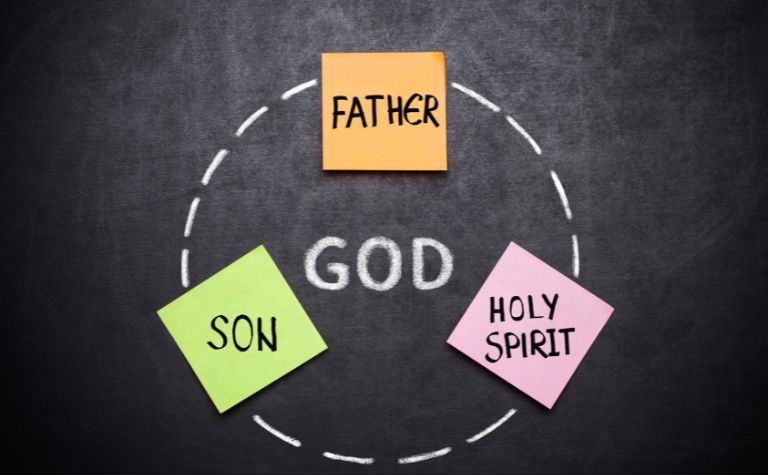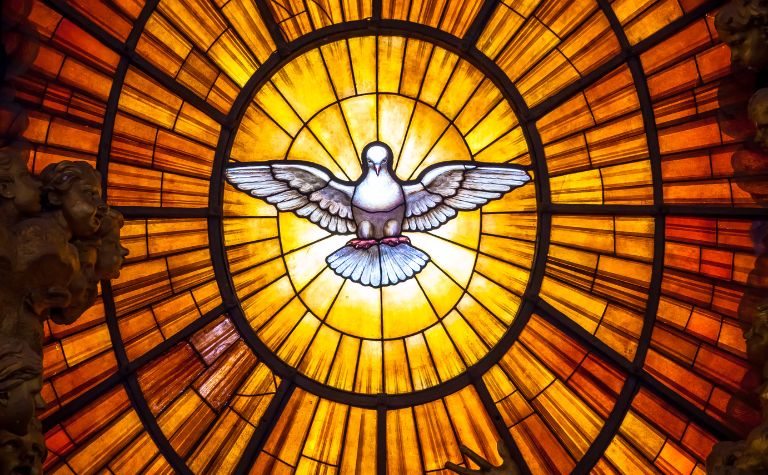Many people have heard of the seven gifts of the Holy Spirit but are unsure what they are or where the Bible mentions them. Are they synonymous with spiritual gifts, or are they different? The confusion is that when readers add up the gifts in the relevant passage, they equal six, not seven. So it’s not surprising that Bible readers often seek clarification on this topic.
The seven gifts of the Holy Spirit are wisdom, understanding, counsel, might, knowledge, godliness, and fear of the Lord. This teaching is a traditional way of organizing the traits of the Messiah listed in Isaiah 11:2-3. Readers shouldn’t confuse them with the New Testament’s teaching on spiritual gifts.
Why do certain traditions mention seven gifts when Isaiah only mentions six? What is the difference between the seven gifts of the Holy Spirit and the spiritual gifts the Apostle Paul refers to in 1 Corinthians, Romans, and Ephesians? What Bible translations mention the seventh gift? Keep reading to learn the answers to these questions and others.
Also see What Is Blasphemy Against the Holy Spirit? to learn more.

The spiritual gifts of the promised Messiah
Isaiah 11:1-3 doesn’t describe the spiritual gifts the Holy Spirit gives people as the New Testament does, but the characteristics of the promised Messiah, Jesus of Nazareth. Though the Holy Spirit ministered powerfully in David’s life (1 Sam. 16:13), the Spirit-empowered ministry of the Messiah would be unparalleled. This means that David’s offspring would far exceed his spiritual giftedness.
The six (or seven) gifts of the Holy Spirit mentioned in Isaiah 11:2-3 describe Jesus Christ. After the prophet compares Israel’s demise to the destruction of a forest — “He will cut down the thickets of the forest with an axe” (Isa. 10:34, ESV) — he builds on the imagery to describe the Messiah.
Isaiah prophesied that a green shoot (i.e. a sprout or branch) of new life would come from one of the stumps in the destroyed forest, i.e., “a shoot from the stump of Jesse” (Isa. 11:1). The “shoot” is the Messiah, Jesus, and Jesse is a reference to the line of David (cf. Ruth 4:18-22). God promised David that the Messiah would come from his lineage (2 Sam. 7:12-16; Matt. 1:1).
The first line in Isaiah 11:2 describes Jesus, the budding shoot: “And the Spirit of the LORD shall rest upon him.” The prophet reveals that the Holy Spirit would “rest” (ESV, NIV, KJV, NASB) upon Jesus. The Hebrew word for “rest” (nuach) doesn’t carry the meaning of not working but being placed in a fixed position. Elsewhere in the Old Testament, translators render nuach as “settled” (e.g. Exod. 10:14).
The following three lines in the verse contain two characteristics the Messiah would possess:
- (1-2) the Spirit of wisdom and understanding
- (3-4) the Spirit of counsel and might
- (5-6) the Spirit of knowledge and the fear of the LORD.
- The beginning of Isaiah 11:3 repeats the characteristic of “the fear of the LORD.”
Also see How To Receive the Holy Spirit to learn more.

Why does tradition mention seven gifts?
There are six gifts mentioned in Isaiah 11:2-3, not seven. Though Isaiah mentions “the fear of the Lord” twice, that still amounts to six different gifts. The seventh gift — “godliness” — isn’t included in most English translations of the Bible because it doesn’t appear in the original Hebrew text.
What is the origin of the seventh gift? “Godliness” first appears in the Septuagint, the Greek translation of the Old Testament, which dates to the 3rd century B.C. The Vulgate, the Latin version of the Bible, also lists the gift. Christian theologian and historian Jerome of Stridon (342-420 A.D.) published the Vulgate in the 4th century A.D., significantly influencing the Church for a millennium.
| Reference | Gift | |
|---|---|---|
| 1 | Isaiah 11:2 (NIV, etal.) | Wisdom |
| 2 | Isaiah 11:2 (NIV, etal.) | Understanding |
| 3 | Isaiah 11:2 (NIV, etal.) | Counsel |
| 4 | Isaiah 11:2 (NIV, etal.) | Might |
| 5 | Isaiah 11:2 (NIV, etal.) | Knowledge |
| 6 | Isaiah 11:2 (NIV, etal.) | Fear of the Lord |
| 7 | Isaiah 11:2 (see below) | Godliness |
| Repeat | Isaiah 11:3 (NIV, etal.) | Fear of the Lord |
Why did the translators of the Septuagint add the phrase? Unfortunately, there is no clear answer for why the translators of the Septuagint added the phrase “and piety.” However, since the words replaced the second mention of “the fear of the Lord,” it’s possible that the translators were attempting to avoid redundancy. Yet, critics of the addition argue that there is meaning to the original repetition.
| Scripture | Original | Translation |
|---|---|---|
| Septuagint | και ευσεβείας (Greek) | and piety (or godliness) |
| Vulgate | et pietatis (Latin) | and of godliness |
| Masoretic Text | וְיִרְאַ֥ת יְהוָֽה׃ (Hebrew) | and the fear of the Lord |
Note: The terms “piety” and “godliness” are attempts to render the same word. Both words fit the possible semantic range of the original phrase. They don’t reflect two different descriptions.
Also see What Are the 12 Gifts of the Holy Spirit? to learn more.
The seventh gift in English Bible translations
Protestant Bible translations prefer to translate the original Hebrew reading. Some translations published in the Catholic tradition retain the original Hebrew reading (e.g. NAB), yet others reflect the Septuagint version (e.g. DR). That some Catholic Bible translations keep the revised reading isn’t an indication of the Septuagint’s impact on the church, but the Vulgate’s.
| Translation | Tradition | English |
|---|---|---|
| English Standard Version (ESV) | (Protestant) | and the fear of the LORD |
| New American Standard Bible (NASB) | (Protestant) | and the fear of the LORD |
| King James Version (KJV) | (Protestant) | and of the fear of the LORD |
| New American Bible (NAB) | (Catholic) | and of fear of the LORD |
| Douay-Rheims (DR) | (Catholic) | and of godliness |
| Catholic Public Domain Version (CPDV) | (Catholic) | and piety |
Also see What Does It Mean To Be Filled With the Holy Spirit? to learn more.

Seven Gifts of the Holy Spirit vs Spiritual Gifts
The gifts the Holy Spirit gives believers to equip and edify the Church include teaching, encouraging, serving, giving, evangelizing, and speaking in tongues (1 Cor. 12:8-10; cf. 12:28-30; Rom. 12:6-8; Eph. 4:11-12).
| Isaiah 11:2-3 | 1 Cor. 12:8-10 | |
|---|---|---|
| Definition | Spirit-given characteristics of the Messiah | Spirit-given gifts to Christians |
| Descriptions | the person and work of Jesus | the talents, aptitudes, and abilities of believers |
| Purpose | to empower Jesus | to edify the Church |
Spiritual gifts mentioned in 1 Corinthians
| 1 Cor. 12:8-10 | 1 Cor. 12:28-30 | 1 Cor. 13:1-3 | 1 Cor. 13:8-9 |
|---|---|---|---|
| Utterance of wisdom | Apostles | Tongues | Prophecy |
| Utterance of knowledge | Prophets | Prophecy | Tongues |
| Faith | Teachers | Knowledge | Knowledge |
| Gifts of healing | Miracles | Faith | |
| Working of miracles | Gifts of healing | Giving | |
| Prophecy | Helping | ||
| Distinguishing between spirits | Administering | ||
| Various kinds of tongues | Various kinds of tongues | ||
| Interpretation of tongues | Interpretation of tongues |
Spiritual gifts mentioned in Romans, Ephesians, and 1 Peter
| Romans 12:6-8 | Ephesians 4:11 | 1 Peter 4:10-11 |
|---|---|---|
| Prophecy | Apostles | Speaking |
| Service | Prophets | Serving |
| Teaching | Evangelists | |
| Exhorting | Shepherds, teachers | |
| Giving | ||
| Leading | ||
| Mercy |
Also see the meaning of Where the Spirit of the Lord Is There Is Freedom
References:
The Oxford Dictionary of the Christian Church. p. 1265.
Source
Related Questions
The Bible teaches that a spiritual realm lies beyond the five senses of seeing, hearing, touch, taste, and smell. Though the unseen immaterial world is significantly different from the physical one,...
One of the most common questions people have about the Holy Spirit is what it means to blaspheme him. People are curious about this because they know it's an unforgivable sin, and some fear they have...
